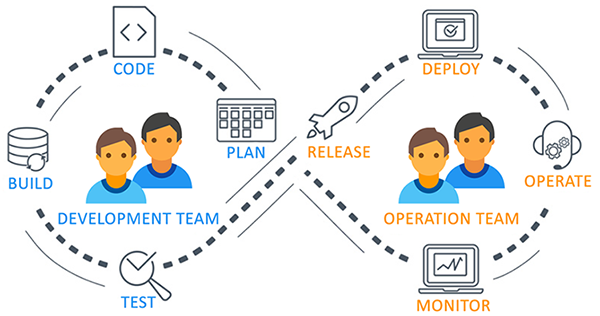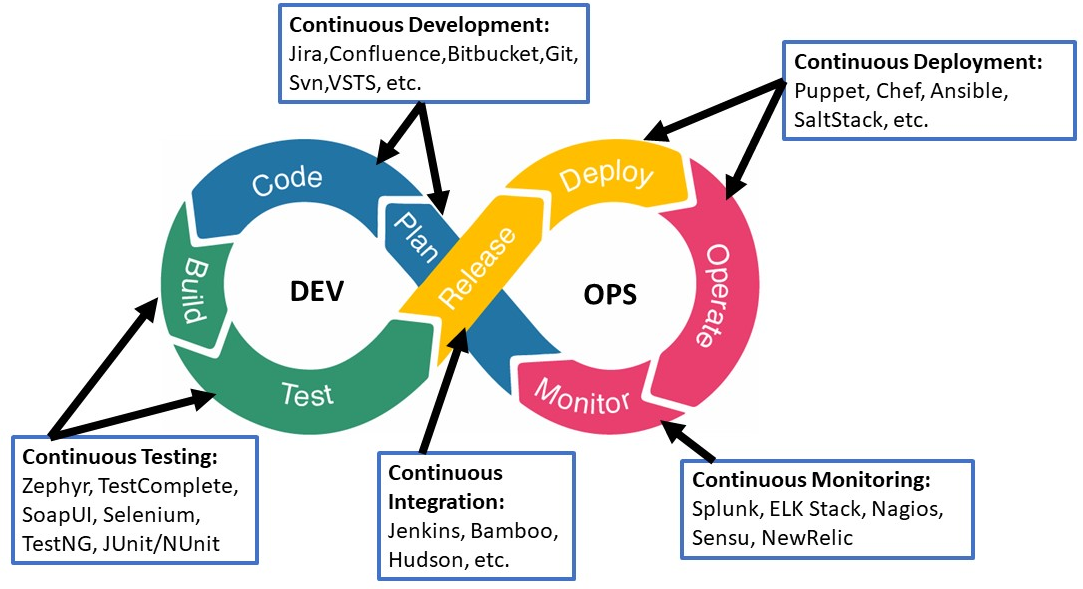
- May 22, 2023
- vastadmin
- 0
DevOps is a partnership between IT Operations and Development that enables automated and repeatable software development and deployment. The firm can provide software applications and services more quickly thanks to DevOps. The words “Development” and “Operations” are combined to make the full term “DevOps.”
It enables businesses to provide better customer service and engage in more robust market competition. It can be summed up as an improvement in communication and collaboration between development and IT operations.
Why is DevOps used?
Agile Development Teams can use DevOps to implement Continuous Integration and Continuous Delivery, which speeds up the time to market for their products.
Other crucial factors include:
- Predictability: The failure rate of new releases is much reduced.
- Reproducibility: Everything should be versioned so that previous versions may always be retrieved.
- Maintainability: procedure for quickly recovering from a new release that crashes or disables the current system.
- Time to market: It streamlines software delivery, which cuts the time to market by up to 50%. Particularly in regard to online and mobile applications.
- Greater Quality: By embracing infrastructure challenges, it aids the team in enhancing the quality of application development.
- Reduced Risk: The software delivery lifecycle includes security considerations, and helps lower faults along the process.
- Resiliency: The Operational state of the software system is more stable, secure, and changes are auditable.
- Cost Efficiency: IT management has long aimed for cost-effective software development, which DevOps offers.
- Breaks larger code base into small pieces: On the agile programming approach, DevOps is founded. As a result, it makes it possible to divide enormous codebases into more manageable pieces.
Why is DevOps Needed?
Business stakeholders want the rate of software delivery to grow. Only 17% of teams can use delivery software fast, according to a study by Forrester Consulting, demonstrating the problem.
- The development and operations teams operated independently before the advent of DevOps.
- Following design-build, distinct processes for deployment and testing were carried out. They took longer than actual build cycles as a result.
- Team members waste a lot of time testing, deploying, and planning instead of really building the project when it isn’t used.
- In production, manual code deployment increases the risk of human mistake.
- Further delays are brought on by the coding and operating teams’ different schedules and lack of coordination.
DevOps Principles:
The following six principles are crucial for implementing DevOps:
- Customer-Centric Action: In order to invest in goods and services, the DevOps team must constantly take customer-centric action.
- End-To-End Responsibility: Performance support must be given by the them up until the end of their useful lives. This raises both the standard of accountability and the calibre of the items that are created.
- Continuous Improvement: The culture emphasises continuous improvement in order to reduce waste and continuously accelerates the improvement of provided goods or services.
- Automate everything: The methodology places a strong emphasis on automation, not just for software development but also for the entire infrastructure landscape.
- Work as one team: The roles of the designer, developer, and tester are already established; all they need to do is collaborate fully as a single team.
- Monitor and test everything: The DevOps team needs effective monitoring and testing protocols, so monitor and test everything.
Who is a DevOps Engineer?
An IT specialist known as a DevOps Engineer manages code releases in collaboration with system administrators, software developers, and other production IT professionals. To communicate and work together with the development, testing, and operations teams, DevOps should possess both hard and soft abilities.
The DevOps methodology necessitates regular, incremental code version updates, necessitating regular deployment and testing schedules. They must be familiar with the fundamentals of programming languages, even though they occasionally need to write original code.
In order to connect code pieces, such as libraries or software development kits, a they will collaborate with the members of the development team.
Roles, Responsibilities, and Skills of a DevOps Engineer
DevOps engineers work full-time, and they are responsible for the production and ongoing maintenance of a software application’s platform.
Following are some expected Roles, Responsibilities, and Skills that are expected from DevOps engineers:
- able to troubleshoot and solve issues with systems across platform and application domains.
- Effectively manage projects using open, standards-based platforms.
- analyse, create, and assess automation systems and scripts
- Boost project transparency through traceability.
- Collaboration can raise quality and lower development costs.
- They need to be problem solvers and quick learners in terms of soft skills.
- Utilizing the best cloud security solutions services to ensure the urgent resolution of system issues

